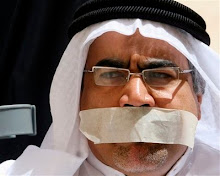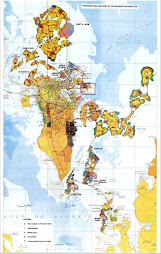IFEX - News from the international freedom of expression community_________________________________________________________________
CAPSULE REPORT - BAHRAIN
12 June 2008
CAPSULE REPORT - BAHRAIN
12 June 2008
Despite advances, journalists still face possible jail terms underprevailing laws, warns IFJ
(IFJ/IFEX) - The following is a chapter from IFJ's "Breaking the Chains2007/2008" report on press freedom across the Arab world and Iran:
Bahrain is one of the Gulf States in which there is an active debate led byjournalists about durable changes to strengthen press freedoms. Press Law47, passed in 2002, includes 17 categories of offences and provides forsentences ranging from six months to five years' imprisonment forcriticising the state's official religion, the king and inciting actionsthat undermine state security. Articles 160, 161 and 168 prescribe prisonsentences of up to five years for possessing or disseminating thoughts thatinsult Islam, criticise the Monarchy or could "damage public interest".
In addition, the law allows fines of up to 6,000 euros for 14 otheroffences, including publishing information related to any case that isunder investigation or being tried, reporting any offence against the headof a state that maintains diplomatic relations with the country or itsaccredited representatives, etc. Additional restrictions on press freedomcame with the anti-terrorism law enacted in August 2006 and a number ofonline publications, mainly of political content, are kept under closemonitoring.
Founded in 2000, the Bahrain Journalists' Association (BJA) represents thebroad range of media and is predominantly concerned with protecting pressfreedom and defending individual journalists from prosecution through legalassistance, public protests and lobbying.
It is active in helping draft the new media law and lobbying for over 40amendments to the original. It has proposed recognition of electronic mediain the new law, its statute, rights and obligations. It also monitors theintroduction of Bahrain's new labour law, which will enable it to transformitself into a trade union and defend journalists' working as well asprofessional rights.
A strong campaign spearheaded by BJA to make deputies amend the law failedafter Islamist MPs in the Lower House insisted on including a clause toimprison journalists who criticise officials or parliamentarians. A newpress law draft prepared and endorsed in May 2007 by the more liberal UpperHouse (Majlis Al-Shura or Consultative Council) is scheduled to be debatedby the Council of Representatives.
In the latest developments, the Bahraini government introduced on 4 May2008 amendments to press law 47/2002, of which the most important eliminateprison sentences for journalists and prior censorship on publications.However, it is still possible to charge and jail journalists on the basisof the penal code and anti-terrorism law.
BJA plans to launch a strong campaign to lobby the Council ofRepresentatives in order to improve further the law to meet journalists'demands.
King Hamad Bin Eisa Al Khalifa appears to be supportive of "progressivelaws that guarantee the independence of the press and the freedom of honestand responsible expression". No journalists have been imprisoned since hebecame the country's leader in 1999.
For further information visit the BJA website: http://www.bja-bh.org/en
For further information, contact the IFJ, International Press Centre,Residence Palace, Block C, 155 Rue de la Loi, B-1040 Brussels, Belgium,tel: +322 235 2200 / 2207, fax: +322 235 2219, e-mail:rachel.cohen@ifj.org, Internet: http://www.ifj.org/
The information contained in this capsule report is the sole responsibilityof IFJ. In citing this material for broadcast or publication, please creditIFJ.







